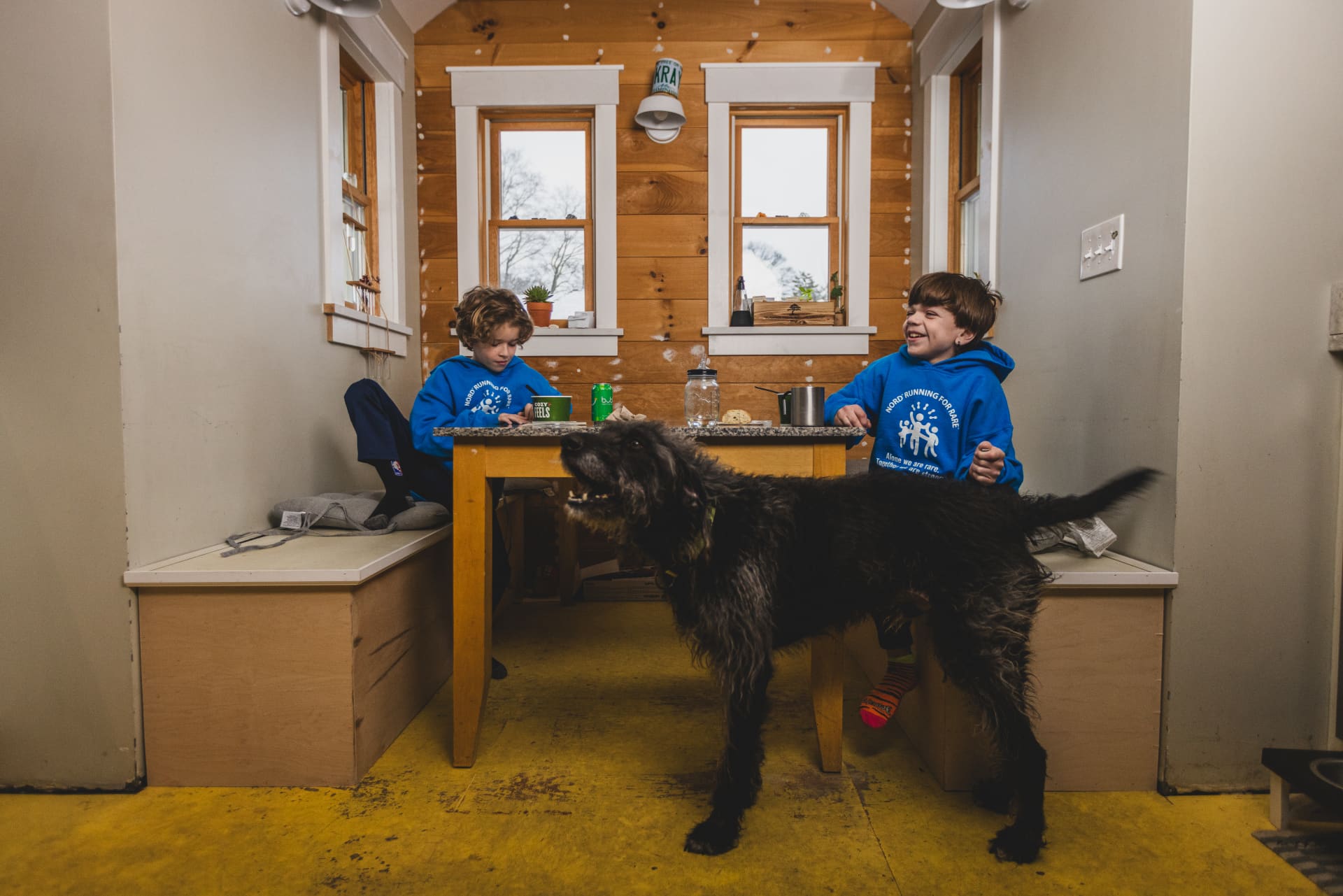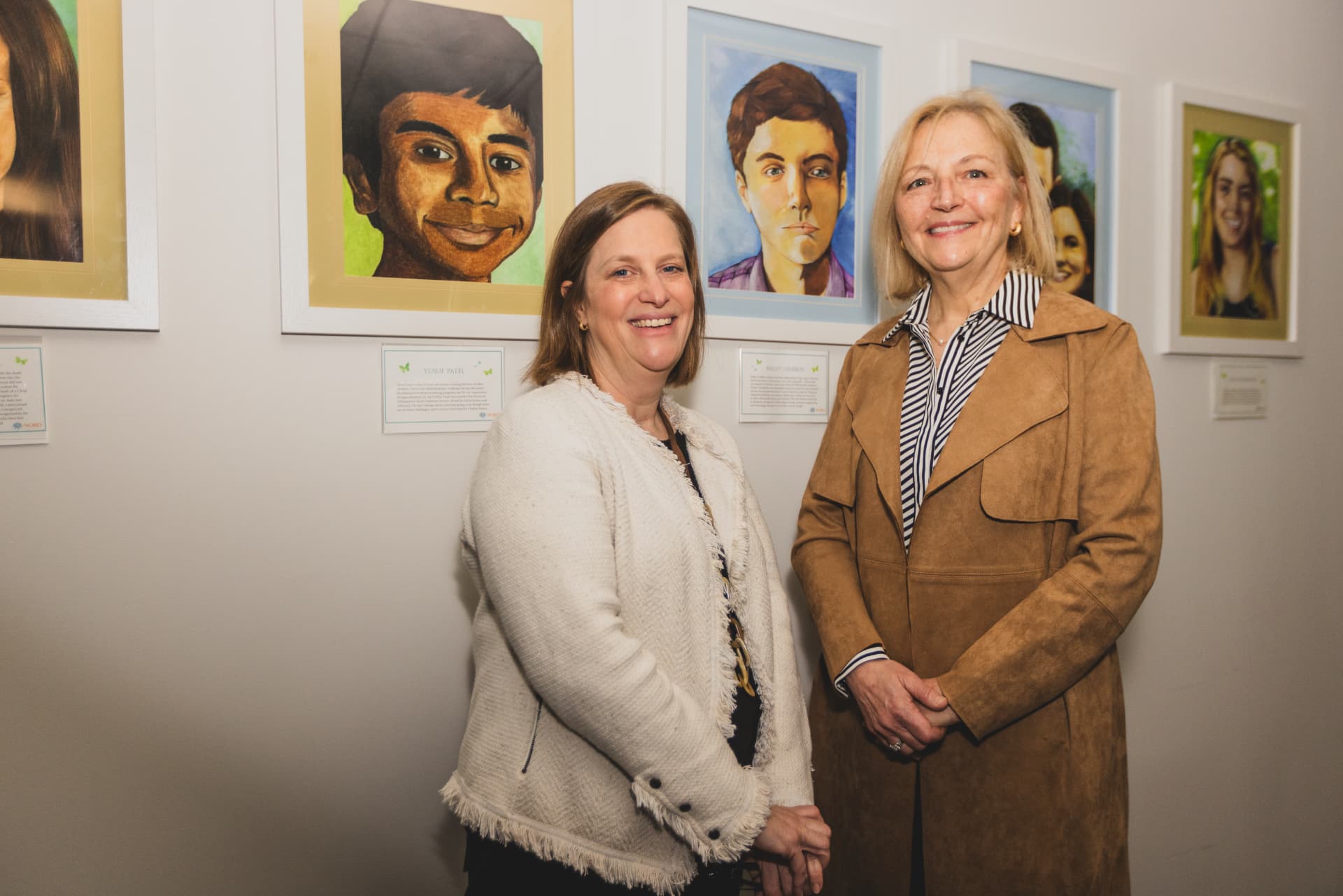Advancing Rare Disease Care in the U.S.
Brighter futures: Mass. families, nonprofits, and industry leaders partner to fuel progress for those with rare diseases
This content has been reposted with permission from Boston Globe Media's Studio/B. Any further use, reproduction, or distribution requires written consent from Boston Globe Media and Takeda.
Together, they’re accelerating early diagnoses, advancing treatments, and building a more supportive, equitable future for the 30 million Americans living with rare diseases.
Delivery room doctors assured first-time mom Emily Viti that her newborn, Christopher, was healthy. But he didn’t breastfeed well, he rarely slept, and when he did, he snored. Throughout his first year, he experienced persistent ear, eye, and sinus infections. He began physical therapy to help his hands, hips, and feet develop properly, and he consistently missed developmental milestones.
After a year of doctor’s appointments, emergency room visits, unanswered questions, and determined advocacy, genetic testing revealed that Christopher had mucopolysaccharidosis type I (MPS I). Also known as Hurler syndrome, MPS I is a life-threatening rare disease that prevents cells from breaking down certain sugar molecules, leading to symptoms that can affect bones, organs, and cognitive development.
What makes Christopher’s story especially uncommon is that MPS I, unlike most known rare diseases, has an approved treatment.
“When we got his official diagnosis, it was the first time that I felt like we were gonna be okay,” Viti says. “It was the worst news you could ever get, but suddenly, there was an answer, and there was a direction.”

Christopher (right) and his younger brother, Jacob, at their home in Massachusetts. Their family’s journey with MPS I sparked a broader mission of advocating for earlier rare disease diagnoses.
Christopher, now 11, loves sports and music. He’s an outgoing and charismatic “old soul,” Viti says, with a gift for forming genuine connections with everyone he meets. His MPS I has been primarily orthopedic — he’s undergone 17 surgeries, including two spinal fusions, a hip replacement, and carpal tunnel surgery. He’s often in discomfort, and it’s hard for him to watch his baseball teammates improve while his body holds him back.
“Every day, Christopher is losing abilities that he had the day before in very small ways,” Viti says. But still, he continues to play.
“The Vitis’ long road to diagnosis is, unfortunately, familiar to many families living with rare diseases,” says Pamela Gavin, chief executive officer of National Organization for Rare Disorders (NORD), a leading nonprofit organization dedicated to improving the health and well-being of over 30 million Americans living with rare diseases by driving advances in care, research, and policy.
“Everyone living with a rare disease deserves the same quality of care and support services as those with more common illnesses,” Gavin says. “That means having health insurance coverage for lifesaving treatments without recurring and unnecessary denials or delays. It also means having access to doctors who know how to diagnose and treat rare conditions as well as vital resources like mental health support and Medicaid, so people with rare conditions get the care they equally need and deserve. At NORD, we work every day to close these gaps — providing critical and lifesaving support and education where few resources exist, while also advocating for improved medical care, increased research, and policies that service the unique needs of millions with rare diseases.”
When answers lead to hope

Cheryl Schwartz of Takeda (left) and Pamela Gavin of NORD (right). Together, their organizations are working to shorten diagnostic delays and empower families affected by rare diseases.
For several years, the Viti family traveled to Washington, D.C., with NORD and the National MPS Society to advocate for the one in 10 Americans facing a rare disease during the week surrounding Rare Disease Day — a global awareness event held each February 28. A key part of their advocacy included the push for advancing federal and state newborn screening to detect treatable rare conditions like MPS as early as possible, when timely intervention is critical to help improve long-term outcomes.
Since 2018, new parents in Massachusetts have had the option to screen for MPS I and several other rare diseases through a voluntary pilot program.
“Those little victories mean so much because somebody else is going to find out early. I always remind Christopher: that’s why we fight,” Viti says. “It’s not always so that your situation is better, but so that someone else’s situation is better than yours was.”
Industry partners play a crucial role in driving progress alongside families living with rare diseases and advocacy organizations. As Massachusetts’ largest life sciences employer, Takeda is deeply embedded in the local health care system and helps advance early diagnosis, equitable care, and long-term support by collaborating with groups like NORD.
“Our support of NORD is rooted in our shared commitment to uplift and empower individuals living with rare diseases,” says Cheryl Schwartz, senior vice president, US rare disease business unit lead, and head of US commercial operations at Takeda. “We strive to accelerate the diagnostic journey, improve the standard of care, and break down barriers, especially for people living in marginalized and underserved communities.”
Running for rare disease advocacy
Christopher also began participating as a community partner in NORD’s Running for Rare signature charity running team and community program. Athletes team up with community partners to put meaning behind their miles of training to raise awareness of rare diseases and fundraise to support NORD’s mission.
“Running for Rare is more than a fundraising program — it’s a movement that builds connection, community, and hope,” says Gavin. “The relationship between runners and community partners is one of the most essential parts of the program,” Gavin says. “It brings the rare partner into the experience in a meaningful way and truly inspires the runners to reach the finish line.”
It inspired Viti, too. She remembers standing at mile 16, watching the Running for Rare team pass by one by one, each runner high-fiving Christopher.
“I should do that,” she remembers thinking. “I should do that in honor of everything that Christopher fights through.”
In 2023, Viti ran the Boston Marathon as a part of the Running for Rare team with Christopher’s name on the back of her singlet.
“You’re running and you’re uncomfortable,” she says, “but if I don’t finish, what am I telling my children? What am I telling everybody else who has a difficult time every day? That I can’t push through five hours of difficulty?’”
Viti not only finished the Boston Marathon that year — she ran it again the next year in honor of a friend’s child with a different rare disease. She also completed the Marine Corps Marathon in Washington, D.C., and the New York City Marathon for Team Running for Rare. At each race, Christopher, her husband, and their younger son, Jacob, traveled with her and cheered her on from the sidelines.
“It was a reminder that as much as our life is hard and complicated and medically complex, you don’t have to shut down all the really wonderful things about life,” Viti says. “You’re traveling the world and experiencing life in ways that, at one point, you maybe thought you weren’t going to get to do — and doing it all while making an impact.”
In April 2025, the Viti family traveled to London, where Viti ran the London Marathon for the MPS Society in the United Kingdom. Though Running for Rare wasn’t an official charity partner of the race, Viti carried its mission with her, proudly wearing her singlet to represent the cause.
Massachusetts’ opportunity to make a rare impact
Massachusetts has long been a hub for medical innovation and global impact.
“With its life sciences ecosystem and world-class medical institutions like Massachusetts General Hospital, Boston Children’s Hospital, and Harvard affiliated hospitals — all which are part of the NORD Rare Disease Centers of Excellence network — Massachusetts is at the forefront of innovation for rare disease patient care and research,” Gavin says.
In 2023, Takeda and NORD partnered to publish a report on reducing diagnostic delays for those with rare diseases, especially for those who are impacted by health inequities and face additional barriers to care. The report outlines four key actions to meet this goal, including increasing access to genomic sequencing and expanding the diversity of research participants.
“We [at Takeda] are honored to partner with advocacy groups like NORD that are actively reshaping the landscape for the millions of people facing a rare disease diagnosis, bringing about meaningful change to create a profound and lasting impact,” Schwartz says. “Through these external partnerships, medical grants, research, and innovative collaborations, we strive to empower a brighter future for the rare disease community.”
US-NON-12187v1.0 06/25
